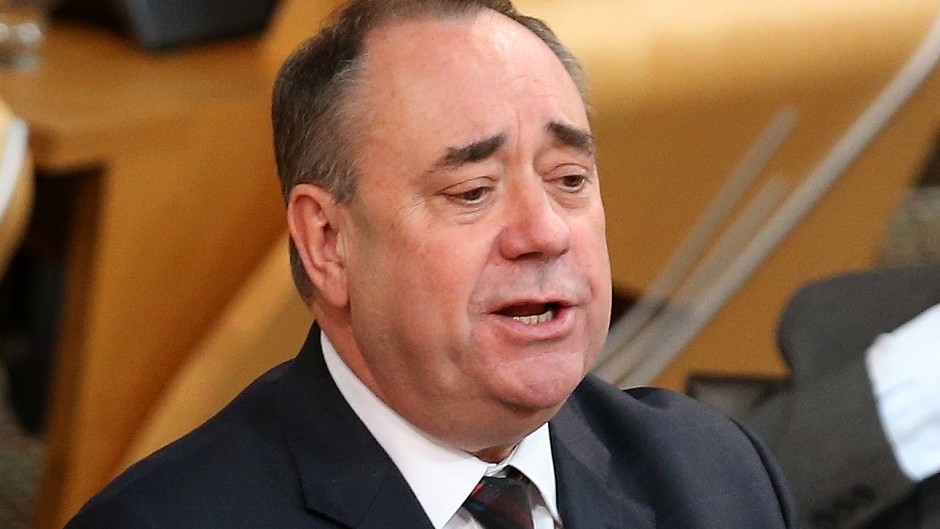Alex Salmond in a Westminster Cabinet post? It sounds incredible but, if the SNP wins a “barrow-load” of MPs, as he predicts, anything could happen.
The former first minister seemed uncomfortable at our suggestion that there could be a seat at a Cabinet table for him – and, ironically, in the heart of what has been the “enemy camp” for years.
He seemed even more uncomfortable when we asked if he would sail back into the Commons as SNP leader, replacing his old friend and colleague, Moray MP Angus Robertson.
He took a couple of quick sips from his coffee, possibly to warm himself up against the ice-cold surroundings inside our second interview location – Strichen town house – before answering.
He appeared uncertain at first at how to respond, but quickly recovered, to deflect both probes.
How about leading SNP negotiations in Westminster to deliver the famous, or infamous Vow, in full? Again, another parry.
He claimed that the prospect of him becoming SNP leader again in Westminster was not something that’s been discussed between him, Nicola Sturgeon or Angus Robertson.
Mr Salmond said: “In terms of being Westminster leader, I’m perfectly happy not being leader. I was an MP at Westminster for 23 years in which time I was deputy leader of the SNP and leader of the SNP.
“The SNP now have an excellent leader in Angus Robertson and I have known Angus since he helped me win Banff and Buchan in 1987. So, it’s not important.”
He brushed aside suggestions of a Cabinet post for him in a formal Westminster coalition involving the SNP after the general election, if he wins Gordon, but most pundits believe the permutations are endless.
“A formal coalition would be pretty unlikely, but Nicola Sturgeon is not ruling it out and she’s right not to rule it out,” he conceded.
So, a formal coalition, maybe to keep the Tories out, is not beyond a possibility?
“It would be using our influence to secure gains for Scotland. We can either be in this opportunity that beckons for us, in a position of no influence or a position of substantial influence. I think being in a position of substantial influence is better.
“As I said, I’ve been in a position, when I was a young MP, of having three MPs in a Parliament of 650, facing a majority of over 100. That is a position of less influence. Being a part of a strong block of SNP MPs in a balanced parliament would be a substantial influence.
“Well, what are the range of possibilities? You can have a formal coalition, you can have a confidence and supply arrangement, you can have a vote-by-vote bargain.”
Mr Salmond was warming to his theme and smiled broadly as he predicted a “barrow-load” of SNP MPs after the general election.
He said: “Whether it’s a small wheel barrow or a big wheelbarrow will depend on the Scottish people. Right now it looks like a pretty big wheelbarrow.
“Nicola Sturgeon has laid this out very clearly, and that is we will not do a deal with the Conservative Party in any shape or form, formal or informal under any circumstances.”
Mr Salmond’s expression darkened as he recalled those painful hours immediately after his referendum defeat.
What he perceived as the sickening sight of David Cameron outside Number 10 remains a source of bitterness, yet a rallying point for future battles.
Mr Salmond said: “The SNP cannot forgive David Cameron for waltzing out of Downing Street the morning after the referendum, and suddenly announcing that progress in Scotland was to go in tandem with changes in England.
“Nothing of that had been mentioned in the referendum campaign. And it’s that breach of faith, that total exposure of the bad faith which rules the Conservative party which rules it out.
“He can’t treat Scotland with contempt and expect Scotland to treat him with respect.”
Mr Salmond’s eyes lit up at the prospect of being in a “gamekeeper-turned-poacher” role in Westminster.
“I’ve been in a position where I ran a minority government between 2007 and 2011. And the great thing about being on the receiving end, and I don’t think there’s any other practising politician in the UK that’s been in that position, is that it teaches you a lot about who in the opposition was most successful in pursuing their objectives.”
Mr Salmond rejected our suggestion that he could be seen as “propping-up” a Miliband coaltion government, if the circumstances presented themselves.
“You say prop-up, we would act in the agenda which I just spelt out – that’s the agenda for getting for Scotland what we were promised, what we were due, to pursue progressive causes like the living wage, not renew the Trident programme, et cetera. And to secure for Scotland the recognition which we are due.”
